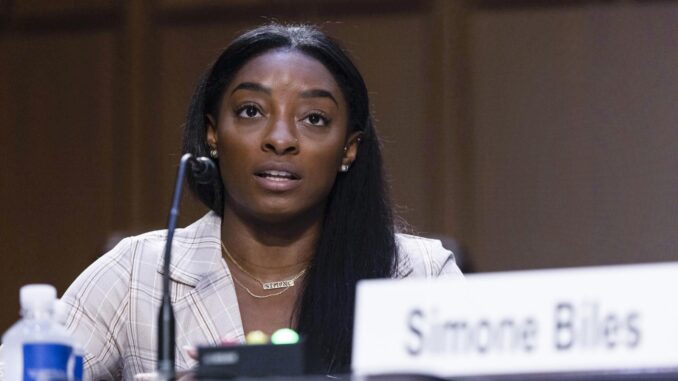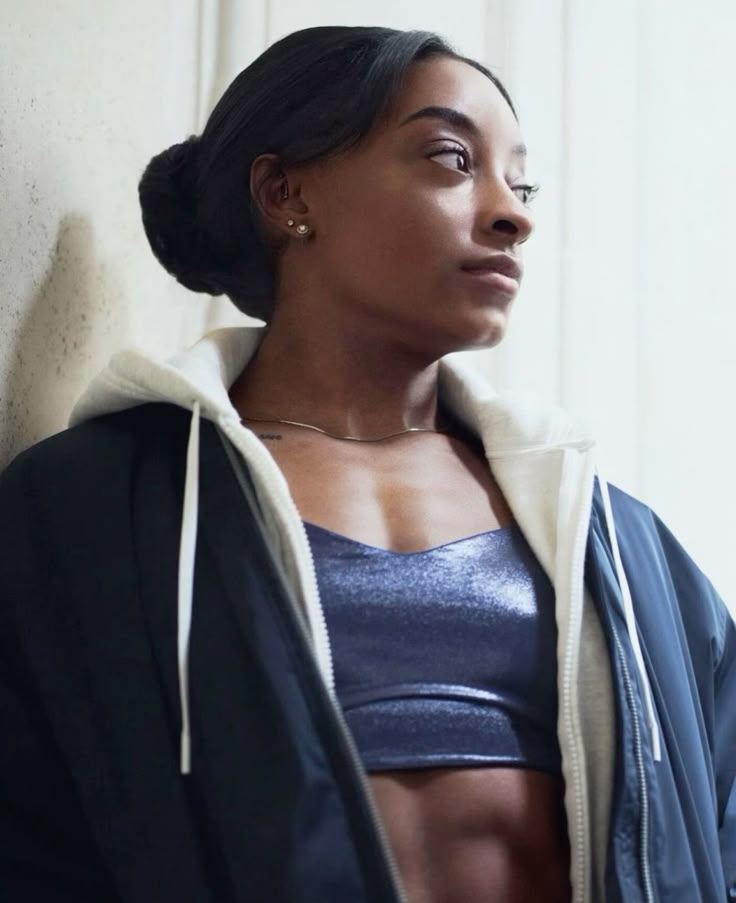
Simone Biles admits she will be at the 2028 Olympics in Los Angeles – but she might be sat in the stands. The superstar gymnast won three gold medals and a silver at Paris 2024, taking her overall Olympic medal haul to 11. But Biles has yet to decide on whether she will compete at a fourth Games in front of her home crowd in the United States in three years’ time. ‘Right now, I am still focusing on healing physically and mentally because the Olympics takes a toll on your body,’ said the 28-year-old. ‘I haven’t got that much time because I’ve sacrificed so much to hang out with my family, my friends, my husband, and stuff like that.
‘So I am really enjoying my time off before I decide if I want to go back to the gym and compete. ‘A lot of people think it’s just a one-year commitment, but it truly is the four years leading up to the Olympics. ‘It is in LA, it’s back in the States, which is so exciting. But if I am going to compete again, I’m not so sure. ‘I will be at the Olympics, but whether it’s on the floor or in the stands, it’s a big decision to make.’
Biles was speaking after being named Laureus World Sportswoman of the Year in Madrid on Monday night. It was the fourth time she had won the award, equalling the record haul of another American idol, Serena Williams. In her victory speech, Biles paid tribute to her husband Jonathan Owens on the date of their second wedding anniversary, admitting he could not attend the ceremony because he was back in training with Chicago Bears.
She also praised another gymnast who was honoured on the evening, Rebeca Andrade, who won the Comeback of the Year award. Andrade, who has bounced back from three ACL tears, beat Biles to Olympic gold on the floor in Paris, while claiming silvers behind her on the vault and in the all-around. And Biles believes the 25-year-old Brazilian will one day replace her as the world’s greatest gymnast. ‘Yes, I do think Rebeca will probably be better than me at some point,’ said the American, who has 30 world medals to Andrade’s nine.
Introduction – What We Know So Far
Simone Biles, the most decorated gymnast in Olympic history, has dropped some intriguing hints about her potential participation in the 2028 Summer Olympics in Los Angeles. After a triumphant performance in Paris 2024, many fans and experts have been wondering: will she suit up again—or will she take a different role entirely? In this article, we’re diving into her latest statements, the possible obstacles she faces, and what it all means for her legacy.
What Simone Has Actually Said
Uncertainty Over Returning
-
Biles has openly said she is undecided about competing in LA 2028.
-
Her decision, she acknowledges, hinges on whether she feels a renewed spark of passion and excitement about pushing herself again.
Her Body’s Current State
-
She has described how Paris took a toll on her physically. Specifically, she said that after the Olympics she “literally collapsed,” got sick for ten days, and felt aches, pains, and exhaustion.
-
She admitted that her body is aging, and the recovery isn’t as easy as it used to be.
Personal Priorities and Lifestyle
-
Simone has also shared that life outside the gymnastics mat is more compelling in many ways: spending time with her husband, enjoying daily moments, and not being constantly in training.
-
She emphasized that to return, the pull must be stronger than the cost. It must excite her in a way that makes all the sacrifices worth it.
Factors That May Influence Her Decision
Age and Physical Wear & Tear
-
By 2028, Biles will be 31 years old, which in elite gymnastics is considered advanced. While some gymnasts have performed at that age, the body demands are intense.
-
Injuries, longer recovery times, and general fatigue increase as athletes age. That reality is something Biles admits she’s already feeling.
Mental Health & Emotional Toll
-
Simone’s journey over recent years hasn’t been just about physical strength—it’s been about mental strength too. Taking breaks, dealing with public pressure, and balancing expectations all matter.
-
The decision whether to continue or not likely intertwines with what is best for her mental well-being. If the cost becomes too high emotionally, that could sway any decision.
Legacy and What “Enough” Means
-
She’s achieved nearly everything in gymnastics: multiple Olympic golds, world titles, signature skills, and a level of dominance very few have reached.
-
One interview had her saying that to come back, “it would really have to excite me” because she’s already accomplished so much.
-
There’s a sense she’s considering the legacy she wants to leave, and whether adding another Olympics enhances that – or risks diminishing by pushing too far.
Motivation & Inspiration
-
The location of the 2028 Games—Los Angeles, in her home country—is tempting. There’s often something special about competing on home soil.
-
But excitement alone might not be enough. She’s stated she would need a strong reason to commit to the rigorous four-year cycle again.
What Experts Think
Comparisons with Gymnasts Who Returned Later
-
Some gymnasts have stayed competitive into their 30s. For example, Maria Gorokhovskaya won the all-around in 1952 at age 30. Others, like Ágnes Keleti, collected golds into their mid-30s.
-
But those are rare outliers. The standard expectation is that elite level gymnastics performance tends to decline with age because of physical demands.
The Evolution of the Sport
-
Gymnastics is evolving: higher difficulty, more risk, more pressure. Sustaining the level necessary to be competitive is harder than ever.
-
The younger generation is ambitious, talented, and pushing the bar higher, full of energy and fewer accumulated injuries.
What Simone’s Presence Looks Like Regardless
Even if she doesn’t compete:
-
She’ll Be There
She has confirmed she will attend the Los Angeles Olympics—either as a competitor or as a spectator/supporter. -
Continuing Her Advocacy
Mental health, athlete welfare, and redefining what success looks like are areas she continues to champion. Even without competing, her voice and influence will matter hugely.
What Would Need to Happen For Her to Return
Here are the possible conditions or motivations that might tip Simone toward competing in LA:
-
A renewed physical condition, meaning recovery and training can align without compromising health.
-
Mental and emotional readiness—feeling excited again, not burned out.
-
Strong motivation or goal—something beyond just another medal. Perhaps new skills, coming back on her terms.
-
Support system—coaching, medical, family, mental health resources that can handle the pressure.
-
Clear alignment of values—if competing means giving up too much of her personal life, is it still worth it?
Risks & Downside of Returning
-
Injury risk increases with time and wear. One wrong move could lead to long recovery or permanent harm.
-
Burnout—physically, mentally, emotionally. Prolonged training at elite level can exhaust passion.
-
Sacrifices—family, rest, privacy, personal milestones might be delayed or sacrificed.
-
Diminished returns—if performance declines, public expectations could be harsh. That might affect her legacy, which is currently nearly untouchable.
Potential Upside & Rewards
-
Historic achievement—if she competes and medals in LA, it would be another milestone to her name.
-
Inspiring others—wherever she competes, showing resilience, prioritizing balance, and choosing what’s right for her could be hugely meaningful.
-
Closure or continuation on her terms—she gets to define how she steps away, or doesn’t: under her terms.
-
Personal fulfillment—if she still loves the sport and competing, doing it again could bring joy beyond medals.
Timeline to Decide
-
If she chooses to compete, the next few years are critical. The preparation for Olympics is a multi-year process: skills, conditioning, routines, mental prep.
-
She’ll have to assess where she’s at physically and emotionally well in advance. Likely decisions will need to be made by 2026–2027 in order to plan properly.
What the Public Might Overlook
-
Fans often see only the medals, the glory—but not the off-camera injuries, exhaustion, pressure, or the mental toll.
-
Simone’s speaking about aging isn’t just physical aging—but the cumulative impact of years of competing.
-
It’s not just about whether she can do it—it’s about whether she wants to, and whether it aligns with what she values now.
My Perspective: What I Think She’ll Do
Based on all she’s said, her history, and current state, here’s my educated guess:
I believe Simone will not compete at LA 2028. Here’s why:
-
She’s already hinted that much would have to come together: health, motivation, excitement.
-
Her body’s warning signs, plus the emotional load, seem to suggest she’s leaning toward stepping back.
-
However, I do believe she will be present—cheering, mentoring, supporting the next generation, perhaps even working behind the scenes or in advocacy roles.
But—and this is important—Simone is unpredictable in the best possible way. She might surprise us, and if she decides to return, it would only elevate her legacy further.

What This Means for Gymnastics & Her Legacy
-
Whether she returns or not, Simone Biles has changed the sport: pushing difficulty, speaking openly about mental health, owning her journey.
-
Her possible absence as a competitor in LA could open space for new stars to emerge. But her influence will continue.
-
Her decision—whatever it is—sets a precedent for elite athletes balancing legacy, health, happiness.
Conclusion
Simone Biles stands at a crossroads with LA 2028—a decision not just about gymnastics, but about values: health over medals, legacy over numbers, joy over pressure. She has made it clear that she hasn’t closed the door, but that any return must feel right. The road ahead will be paved with reflection, tough trade-offs, and probably public speculation. Whatever she chooses, her impact is already indelible—not just in scoreboards, but in conversations about what it means to be a champion in modern times.